Folding Doors in Commercial Spaces: Maximize Accessibility
Step inside any successful office, retail outlet, or restaurant and you would find one thing in common: smart space optimization. Modern businesses are always on the lookout for ways to make their environments open, friendly, and more accessible. This is where folding doors come in, not just as a design decision but a necessity.
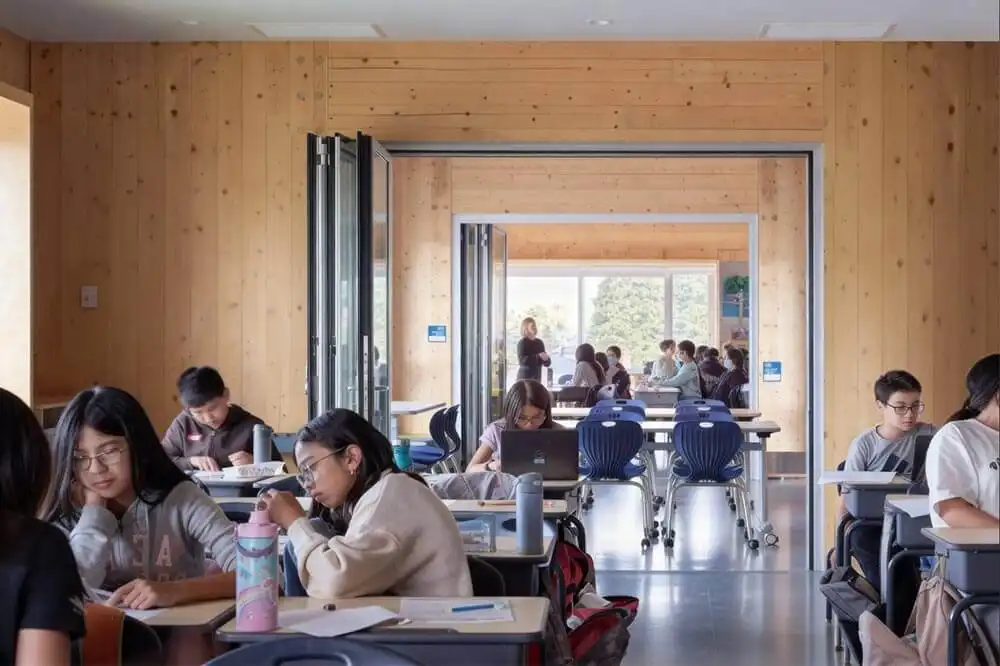
Folding doors upgrade the functionality and overall experience of commercial spaces by ensuring smooth transitions between indoor and outdoor areas. Read on to find out how this design solution is redefining the contemporary commercial landscapes.
Folding Doors: The Hallmark of Accessibility in Commercial Spaces
Accessibility is not only a design issue. It is a means of establishing functional and inclusive spaces where all people have unrestricted movement. The availability of features, such as folding doors, helps to fulfill these expectations.
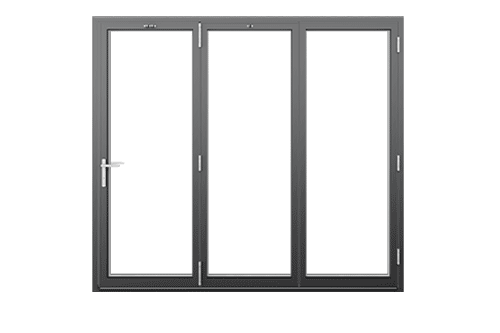
Here’s why accessibility is always a top consideration for commercial spaces:
Legal Requirements:
There are legal regulations such as the Americans with Disabilities Act (ADA), which has set out clear specifications regarding general accessibility. Folding doors may guarantee adherence to such regulations and prevent disrespect toward any visitor.
User Benefits:
The benefits are not limited to people with disabilities. Barrier free entry is convenient to parents who come with strollers, luggage carrying travelers, and delivery workers. Even the flow of foot traffic is maintained with the use of folding doors without creating a bottleneck.
Business Advantages:
Easy to reach areas get higher traffic, longer occupancy, and customer loyalty. The inclusivity reputation boosts brand recognition and increases the number of customers.
So, What Are Folding Doors?
Folding doors consist of multiple panels, which fold neatly to the side when they are opened. They are meant to conserve space yet form broad customer-friendly openings in busy business environments. Here are some key features of folding doors:
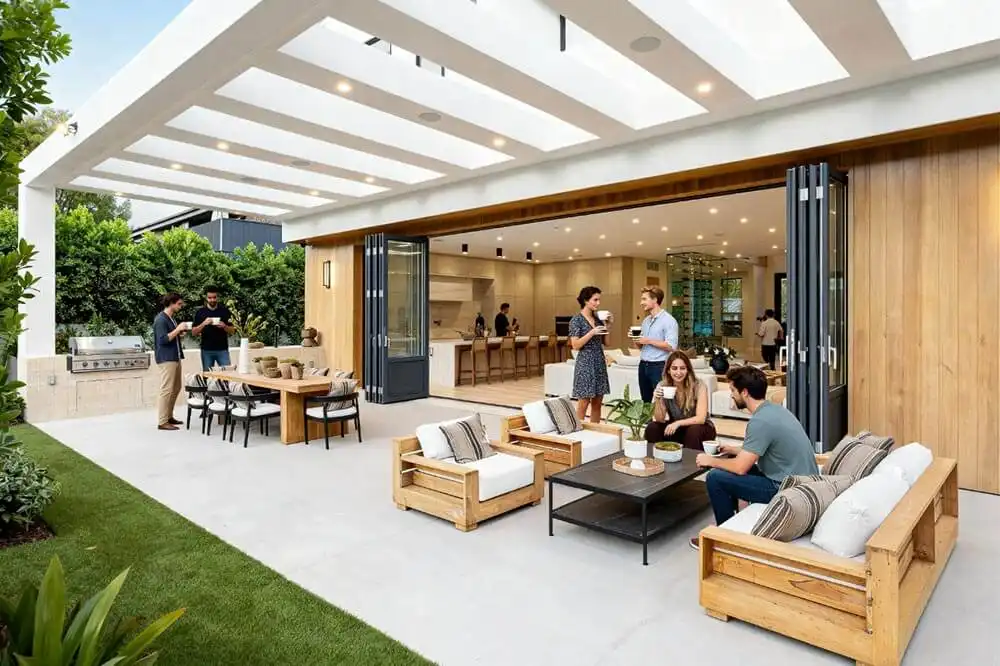
Wide Openings:
These doors have the ability to turn entire walls into wide doorways. This enables free movement of traffic in commercial areas.
Acoustic Control:
A lot of folding doors are soundproofed. This comes in handy especially in crowded urban centers, offices, or areas that need privacy.
Low-Maintenance Operation:
The doors are characterized by smooth-track glides and easy to clean surfaces, and, thus, they are easy to use in business-related areas.
Use Flexibility:
Folding doors can be opened half way to allow ventilation or completely to enable maximum access. This adaptability makes them an excellent option in a wide range of scenarios.
Modern Hardware Options:
The locking systems are advanced, hinges are hidden, and the profiles are slim, which provides the doors with maximum security and style at the same time.
These attributes render folding doors as a smart, multi-purpose option for businesses that want to have aesthetic value in addition to a good practical functionality.
Benefits of Folding Doors for Maximizing Accessibility
This type of door is turning into a distinctive element of modern commercial architecture. For business owners and property managers, they offer a level of practicality, accessibility, and design flexibility that’s scarcely matched by any other type of door system.
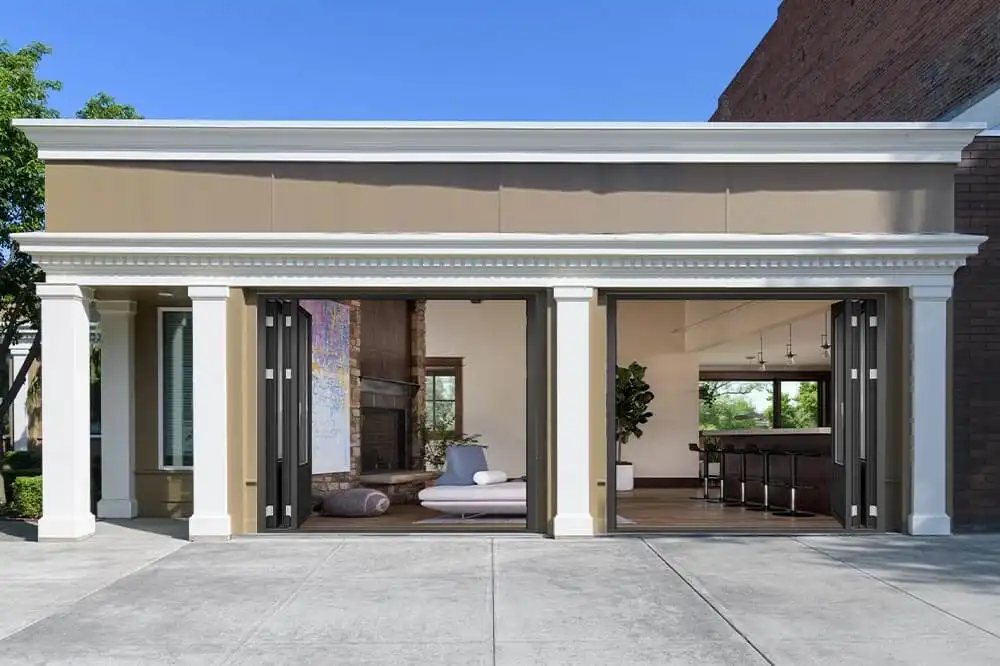
Here are some other prominent advantages of folding doors:
Space Optimization
In retail areas that are busy, every square foot counts. The hinged doors(also known as casement doors) of traditional designs use wide arcs to open the door, and this aspect can restrict the positioning of furniture and foot traffic. Folding doors, however, are stacked up against the wall when open thus taking little to no floor space. This is particularly useful in restaurants, offices, and stores where layout effectiveness has a direct effect on customer experience and revenue potential.
Improved Accessibility
Accessibility is becoming an increasingly important consideration and folding doors can bring much to it by providing broader and free space openings. This gives individuals with wheelchairs, walkers, and mobility aids an easier way in and out. Folding doors reduce the barriers and allow businesses to comply with legal requirements, as well as to promote inclusiveness and comfort to all users.
Versatility and Flexibility
Folding doors are among the few architectural features that are super adaptable. They may be used as complete wall separation so that big spaces can be separated into private meeting rooms or event areas and opened again to be used by others. They also offer a smooth transition between indoor and outdoor spaces and are, therefore, perfect in restaurants that have patios or terraces. Such flexibility enables businesses to redesign their space in a short time and in line with the needs.
Aesthetic Appeal
This kind of door adds beauty to any business environment. They come in a wide variety of materials, finishes, and glass options to fit both modern and traditional designs. Their sharp edges and large openings give them an appearance that is open, light, and welcoming. To businesses, this attractiveness is translated into better first impressions and a more refined brand image.
If you want to go deeper into folding door details, read our full guide on Folding Glass Doors Everything You Need to Know.
Folding Doors in Different Commercial Settings
They can be used in a wide variety of commercial areas. They fit the requirements of various industries, enhance functionality, and accessibility as well as the design.
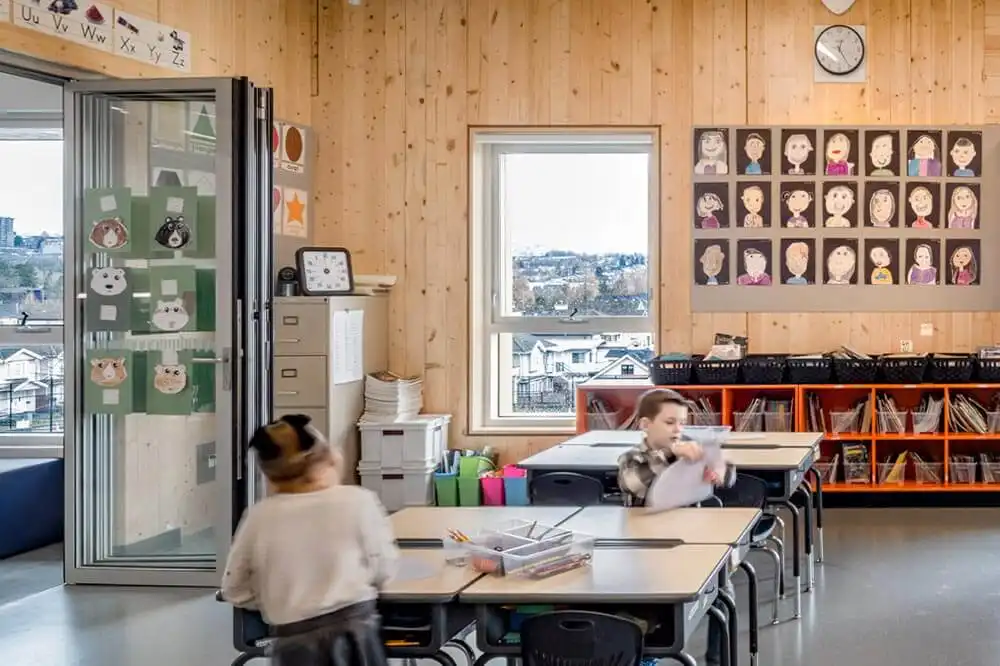
Retail Spaces
In stores and shopping centers, folding doors make spaces more flexible and accessible. They are also used in showrooms to manipulate layouts with a minimum of effort, giving maximum floor space to displays.
Restaurants and Cafes
Folding doors are very popular in restaurants and cafes since the wide apertures allow servers and customers to move freely, in addition to creating a bright and inviting environment.
Healthcare Facilities
Such these doors are feasible in patient rooms and waiting areas of a clinic or a hospital. They provide easy access to patients, staff, and visitors and save space in narrow corridors. They are also used to overcome immobility issues and easily accommodate wheelchairs or medical carts.
Offices and Work Spaces
Open-plan offices take advantage of folding doors to separate or combine spaces without losing flexibility. This arrangement enables companies to strike a balance between privacy and teamwork without wasting precious office space.
Public Buildings and Institutions
These doors are also employed in buildings such as libraries, museums, schools and government offices. They enable versatile room utilization with the ability to open up spaces to host events or to subdivide them to suit smaller groups.
Tips for Choosing the Right Folding Door for Your Commercial Space
Opt for the perfect folding door does not only concern the style; it also involves finding the correct combination between functionality and longevity. Business owners and facility managers have a wide range of choices, but many factors should be taken into consideration before making a business decision.
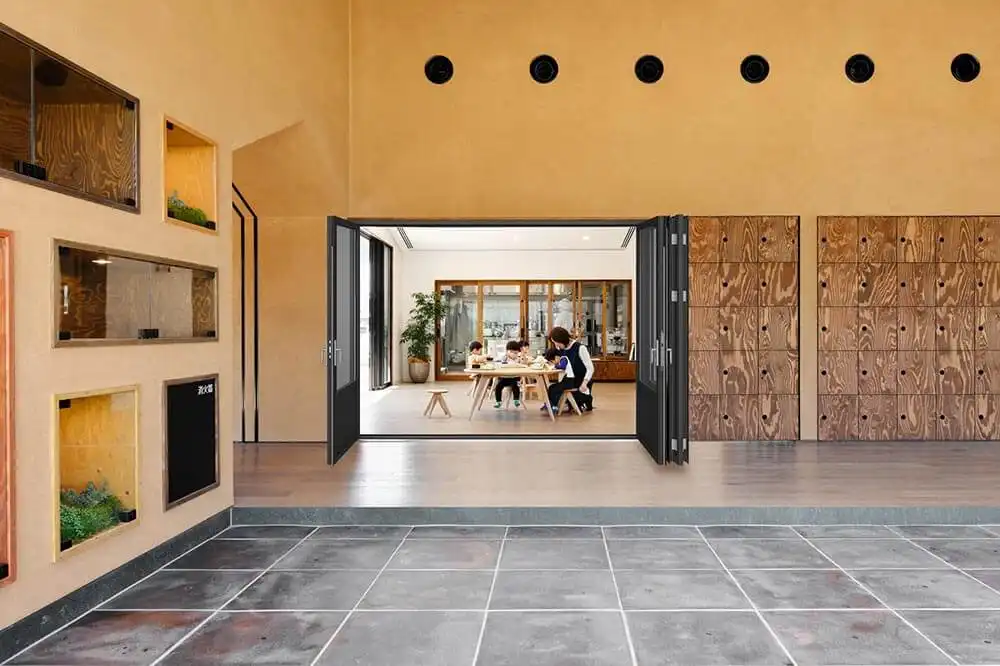
Here are some quick tips for choosing folding doors that guarantee functionality and accessibility in commercial spaces:
Consider Material and Durability
The material of the folding door is significant in the performance and appearance. Aluminum frames are light, strong, and resistant to corrosion and thus they are used in commercial areas that have high traffic. Wood is warmer and more traditional, whereas glass panels make interiors natural in terms of light and openness. The appropriate material should be in accordance with the requirements of the space and in line with the long-term use.
Keep Accessibility & Compliance in Mind
Accessibility should also be one of the priorities when selecting folding doors. Broad aisles, smooth tracks and convenient hardware make sure everybody is able to navigate through the space, even people with mobility issues. The design should also meet local quality of access and building codes.
Look for Insulation and Energy-Efficient Solutions
Energy expenses may be high in business settings. The use of insulated glass in folding doors or thermal resistant combats not only maintain a comfortable indoor temperature but also reduce energy consumption. This comes in handy especially in restaurants, offices, or stores where doors are opened most of the time.
Focus on Style and Individuality
Each business area is individual, and it is important to customize. Folding doors could be customized by size, finish, and design to depict the brand name and the architectural design of a company. Transparent glass could be a good design in the showroom or office, whereas opaque or colored glass could be considered in cases where privacy is required.
Take Maintenance and Durability Into Account
A good folding door should be strong and easy to look after. If you choose a superior or top-notch one, it will last longer and cause fewer problems. Still, simple upkeep is important. Keep the tracks and hinges clean so the panels move smoothly. Wipe down the surface to keep it looking fresh. If the door has an automatic system, a quick check-up now and then helps prevent breakdowns.
Conclusion
Folding doors open up commercial spaces, conserve space, and elevate the customer experience. They provide spacious apertures and a contemporary appearance making the space inviting to all. Businesses that invest in folding doors demonstrate that they appreciate the comfort of their customers, clients, and employees as well as their accessibility. If you are looking for folding doors for your space, it is best to engage a reputable supplier to get the best solution and deals. Reach out to a professional door company, such as WANJIA, to explore folding door solutions that match your needs and bring lasting value.
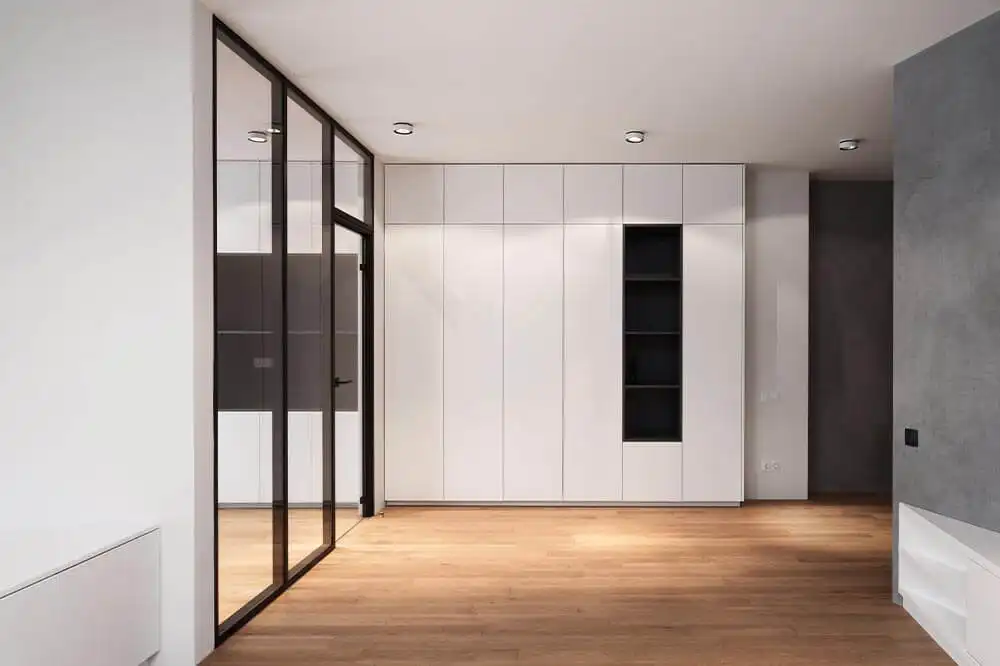
Related Folding Door Comparison Blogs:
